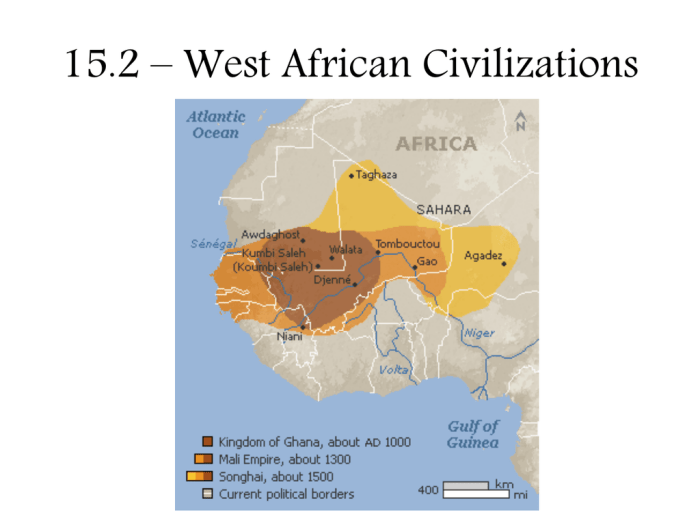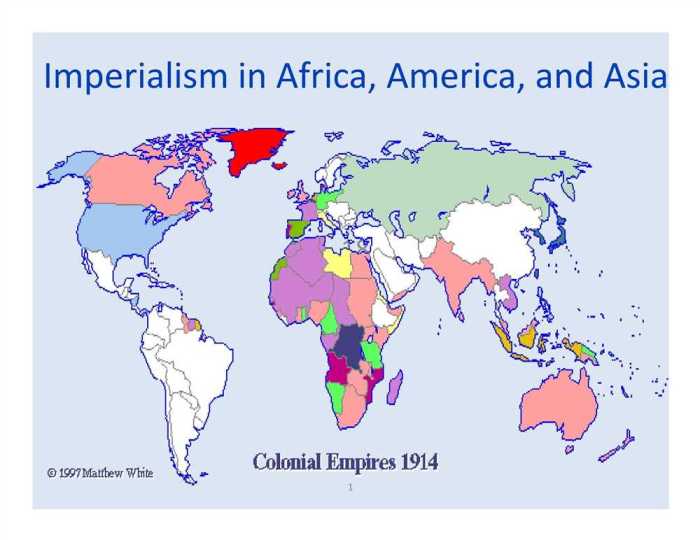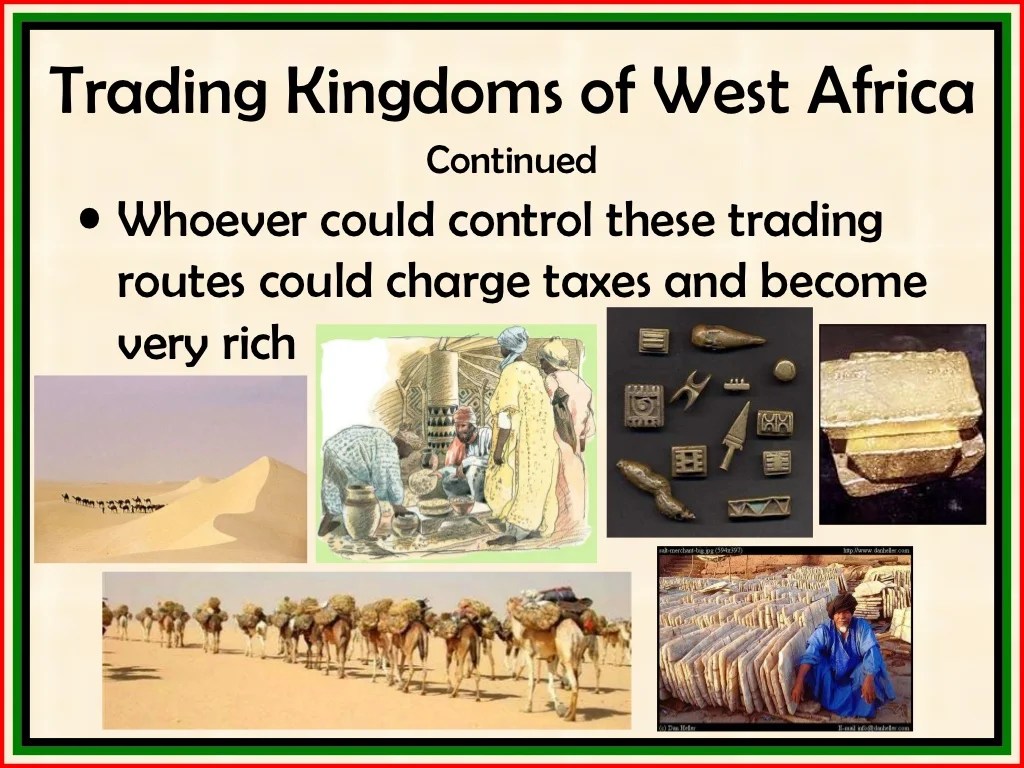As Kingdoms of West Africa DBQ Answer Key takes center stage, this opening passage beckons readers with gaya akademik dengan tone otoritatif into a world crafted with good knowledge, ensuring a reading experience that is both absorbing and distinctly original.
West Africa’s rich tapestry of kingdoms, including Ghana, Mali, and Songhai, played a pivotal role in shaping the continent’s history, economy, and culture. This comprehensive guide delves into the intricacies of these empires, exploring their rise, reign, and eventual decline, while shedding light on the vibrant trade networks and cultural advancements that defined the region.
1. Ghana Empire

The Ghana Empire emerged in West Africa during the 8th century and reached its peak in the 11th century. It was centered in present-day southeastern Mauritania and stretched across parts of Senegal, Mali, and Niger. The empire’s wealth and power were based on its control of the trans-Saharan trade routes, which facilitated the exchange of gold, salt, and other goods.
Political and Economic Structures
The Ghana Empire was ruled by a king, who was both the political and spiritual leader. The empire was divided into provinces, each governed by a governor appointed by the king. The empire’s economy was based on agriculture, trade, and gold mining.
Gold was the most important commodity, and it was used to purchase luxury goods from North Africa and Europe.
Rise and Fall
The Ghana Empire rose to power due to its control of the trans-Saharan trade routes. The empire’s wealth and power attracted invaders, and in the 11th century, the empire was conquered by the Almoravids, a Berber dynasty from North Africa.
The Ghana Empire declined after the Almoravid conquest, but it continued to exist until the 13th century.
2. Mali Empire
The Mali Empire emerged in West Africa in the 13th century and reached its peak in the 14th century. It was centered in present-day Mali and stretched across parts of Senegal, Mauritania, Niger, and Burkina Faso. The empire’s wealth and power were based on its control of the trans-Saharan trade routes and its vast gold reserves.
Wealth and Trade Networks
The Mali Empire was one of the richest empires in West Africa. Its wealth was based on its control of the trans-Saharan trade routes and its vast gold reserves. Gold was the most important commodity, and it was used to purchase luxury goods from North Africa and Europe.
The empire also traded in salt, slaves, and other goods.
Cultural and Intellectual Advancements
The Mali Empire was a center of learning and culture. The empire’s capital, Timbuktu, was a major center of Islamic scholarship. The empire also produced a number of famous scholars, including Mansa Musa, who is known for his pilgrimage to Mecca in 1324.
3. Songhai Empire

The Songhai Empire emerged in West Africa in the 15th century and reached its peak in the 16th century. It was centered in present-day Niger and stretched across parts of Mali, Burkina Faso, and Benin. The empire’s wealth and power were based on its control of the trans-Saharan trade routes and its vast gold reserves.
Origins and Expansion
The Songhai Empire originated in the city of Gao, which was a major center of trade on the Niger River. The empire expanded rapidly under the leadership of Sonni Ali Ber, who conquered a vast territory in the 15th century.
The empire’s expansion continued under Askia Muhammad I, who established a centralized government and introduced a number of reforms.
Administrative and Military Systems
The Songhai Empire had a well-organized administrative and military system. The empire was divided into provinces, each governed by a governor appointed by the emperor. The empire also had a standing army, which was used to maintain order and defend the empire’s borders.
Interactions with Other African Kingdoms
The Songhai Empire had a complex relationship with other African kingdoms. The empire traded with neighboring kingdoms, but it also engaged in conflict with some of them. The Songhai Empire was eventually conquered by the Moroccan Saadi dynasty in 1591.
4. West African Trade and Economy
West Africa has a long history of trade and economic activity. The region was a major center of the trans-Saharan trade routes, which facilitated the exchange of goods between North Africa and sub-Saharan Africa. Gold, salt, and slaves were the most important commodities traded on these routes.
Gold, Salt, and Other Commodities
Gold was the most important commodity traded in West Africa. Gold was found in abundance in the region, and it was used to purchase luxury goods from North Africa and Europe. Salt was another important commodity, and it was traded from the Sahara Desert to the forest regions of West Africa.
Other commodities traded in West Africa included slaves, ivory, and kola nuts.
Impact of Trade on West African Kingdoms, Kingdoms of west africa dbq answer key
Trade had a major impact on the development of West African kingdoms. The wealth generated from trade allowed these kingdoms to build large armies, construct impressive cities, and support a growing population. Trade also led to the spread of new ideas and technologies in West Africa.
5. Religion and Culture in West Africa: Kingdoms Of West Africa Dbq Answer Key

West Africa has a rich and diverse religious and cultural heritage. The region is home to a variety of religions, including Islam, Christianity, and traditional African religions. Islam is the most widespread religion in West Africa, and it was introduced to the region by Arab traders in the 7th century.
Influence of Islam and Other Religions
Islam has had a major influence on West African culture. The religion has shaped the region’s architecture, music, and art. Islam has also played a role in the development of West African political and economic systems. Christianity is another important religion in West Africa, and it was introduced to the region by European missionaries in the 15th century.
Traditional African religions continue to be practiced in West Africa, and they have had a significant influence on the region’s culture.
Artistic and Architectural Achievements
West Africa has a rich tradition of artistic and architectural achievement. The region is home to a number of famous mosques, including the Great Mosque of Djenné in Mali. West Africa is also known for its bronze sculptures, which are often used to depict religious and historical figures.
User Queries
What were the key factors that contributed to the rise of the Ghana Empire?
Control over trans-Saharan trade routes, abundant gold resources, and a strong military
How did the Mali Empire expand its influence beyond its borders?
Through military conquests, diplomatic alliances, and the establishment of trade networks
What was the significance of the Songhai Empire’s administrative system?
It ensured efficient governance, centralized authority, and maintained law and order across a vast territory